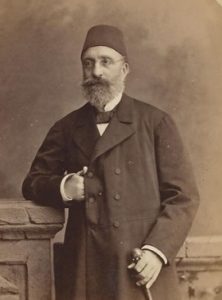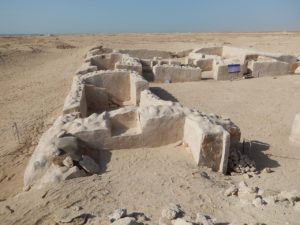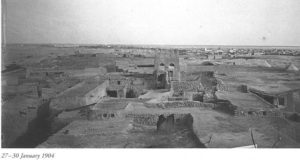
In February 1893, Mehmed Hafiz Pasha arrived in Qatar in the interests of seeking unpaid taxes and accosting Jassim bin Mohammed’s opposition to proposed Ottoman administrative reforms. Fearing that he would face death or imprisonment, Jassim retreated to Al Wajbah (16 km or 10 mi west of Doha), accompanied by several tribe members. Mehmed’s demand that Jassim disbands his troops and pledge his loyalty to the Ottomans was met with refusal. In March, Mehmed imprisoned Jassim’s brother and 13 prominent Qatari tribal leaders on the Ottoman corvette Merrikh as punishment for his insubordination. After Mehmed declined an offer to release the captives for a fee of 10,000 liras, he ordered a column of approximately 200 troops to advance towards Jassim’s Al Wajbah Fort under the command of Yusuf Effendi, thus signalling the start of the Battle of Al Wajbah.

Effendi’s troops came under heavy gunfire by a sizable troop of Qatari infantry and cavalry shortly after arriving at Al Wajbah. They retreated to Shebaka fortress, where they were again forced to draw back from a Qatari incursion. After they withdrew to Al Bidda fortress, Jassim’s advancing column besieged the fortress, resulting in the Ottomans’ concession of defeat and agreement to relinquish their captives in return for the safe passage of Mehmed Pasha’s cavalry to Hofuf by land.

Although Qatar did not gain full independence from the Ottoman Empire, the result of the battle forced a treaty that would later form the basis of Qatar’s emerging as an autonomous country within the empire.
British period (1916–1971):
By the Anglo-Turkish Convention of 1913, the Ottomans agreed to renounce their claim to Qatar and withdraw their garrison from Doha. However, with the outbreak World War I, nothing was done to carry this out and the garrison remained in the fort at Doha, although its numbers dwindled as men deserted. In 1915, with the presence of British gunboats in the harbor, Abdullah bin Jassim Al Thani (who was pro-British) persuaded the remainder to abandon the fort and, when British troops approached the following morning, they found it deserted.
Qatar became a British protectorate on 3 November 1916, when the United Kingdom signed a treaty with Sheikh Abdullah bin Jassim Al Thani to bring Qatar under its Trucial System of Administration. While Abdullah agreed not to enter into any relations with any other power without prior consent of the British government, the latter guaranteed the protection of Qatar from aggression by sea and provide its ‘good offices’ in the event of an attack by land – this latter undertaking was left deliberately vague. On 5 May 1935, while agreeing an oil concession with the British oil company, the Anglo-Persian Oil Company, Abdullah signed another treaty with the British government which granted Qatar protection against internal and external threats. Oil reserves were first discovered in 1939. Exploitation and development were, however, delayed by World War II.
